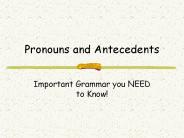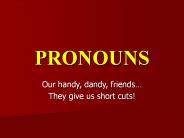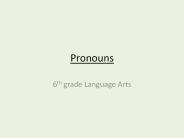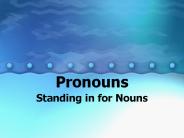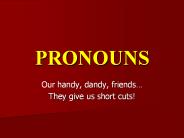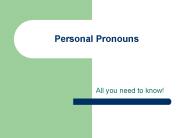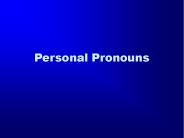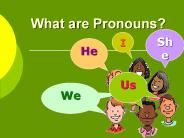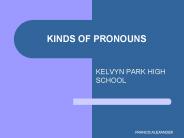Pronouns And Antecedents PowerPoint PPT Presentations
All Time
Recommended
Pronouns and Antecedents Important Grammar you NEED to Know! Here s Another Example My biggest problem are the many incomplete homework assignments I need to finish.
| PowerPoint PPT presentation | free to download
Pronouns and Antecedents A pronoun must agree with its antecedent in three ways: Person (1st, 2nd or 3rd). Number is the quality that distinguishes between ...
| PowerPoint PPT presentation | free to download
Pronouns and Antecedents A pronoun must agree with its antecedent in three ways: Person (1st, 2nd or 3rd). Number is the quality that distinguishes between ...
| PowerPoint PPT presentation | free to download
Pronouns and Antecedents TN Language Arts Checks for Understanding 0601.1.1 0701.1.1 0801.1.1 The following should be copied into student notebooks.
| PowerPoint PPT presentation | free to download
Mom went shopping at the mall; she was there for a long time. ... Since Jessica painted her room hot pink, her friends now want to hang. out there. ...
| PowerPoint PPT presentation | free to view
Pronouns & Antecedents Subject & Object Possessive Reflexive Interrogative More Examples One of the books was lost. Several in the club are good at speaking in public.
| PowerPoint PPT presentation | free to view
Rickie gets on the plane. They are very excited about his trip. NOMINATIVE vs. OBJECTIVE Pronouns used as subjects are in the nominative case.
| PowerPoint PPT presentation | free to download
PRONOUNS Our handy, dandy, friends They give us short cuts! INTERROGATIVE OR RELATIVE? WHOSE DONKEY IS THAT? INTERROGATIVE OR RELATIVE? WHICH CHEESE IS YOUR FAVORITE?
| PowerPoint PPT presentation | free to view
PowerPoint Presentation
| PowerPoint PPT presentation | free to download
PRONOUNS Our handy, dandy, friends They give us short cuts! What s a dependent clause? It starts with a dependent clause word. (that, which, who, whom, whose) A ...
| PowerPoint PPT presentation | free to download
3 Kinds of Personal Pronouns: Identify the personal pronoun. When I turned on the lie detector, it told me it had a headache. I can t believe you ate thirty-nine ...
| PowerPoint PPT presentation | free to download
PRONOUNS - Notes From Mr. Snell's Office ... pronouns
| PowerPoint PPT presentation | free to download
PRONOUNS Our handy, dandy, friends They give us short cuts! PRONOUNS TAKES THE PLACE OF A NOUN OR A PRONOUN The boy looks at the books.
| PowerPoint PPT presentation | free to download
Give the book to me. ... it they ACTIVITY 1 Write sentences using each of the subject pronouns. ... PowerPoint Presentation Author: Sandra Boyd Last modified by:
| PowerPoint PPT presentation | free to view
Pronouns 6th grade Language Arts Pronouns Takes the place of a noun Replace a noun with a pronoun to avoid using the same nouns over and over and over and over
| PowerPoint PPT presentation | free to download
Standing in for Nouns Personal Pronouns A pronoun is a word that takes the place of one or more nouns. Pronouns that refer to people or things are called personal ...
| PowerPoint PPT presentation | free to download
Personal Pronouns Subject Pronouns Object Pronouns An object pronoun is used as the direct/indirect object or the object of a preposition. Give the book to me. The ...
| PowerPoint PPT presentation | free to download
* Go over each statement. Read the green statement and have a student volunteer to restate it in first person. The yellow line is the answer. Say, The pronouns are ...
| PowerPoint PPT presentation | free to download
Pick out the indefinite pronoun in each sentence below. ... Reflexive and intensive pronouns should never be used as the subject of the sentence. ...
| PowerPoint PPT presentation | free to view
PowerPoint Presentation ... Sandra Boyd
| PowerPoint PPT presentation | free to view
PowerPoint Presentation
| PowerPoint PPT presentation | free to download
PRONOUNS Indefinite Pronouns Indefinite pronouns refer to people, places, or things, often without specifying which ones. Indefinite Pronoun Examples SINGULAR Another ...
| PowerPoint PPT presentation | free to download
A pronoun is a word that takes the place of one or more nouns. Pro- means for (standing FOR a noun) http://www.youtube.com/watch?v=yg9MKQ1OYCg Pronouns that are ...
| PowerPoint PPT presentation | free to download
PRONOUNS Indefinite Pronouns Indefinite pronouns refer to people, places, or things, often without specifying which ones. Indefinite Pronoun Examples SINGULAR Another ...
| PowerPoint PPT presentation | free to view
Pronouns Parts of Speech What Are Pronouns? Pronouns take the place of nouns. Tim went to Tim s house to do Tim s chores. Tim went to his house to do his chores.
| PowerPoint PPT presentation | free to download
Nouns and Pronouns ...
| PowerPoint PPT presentation | free to view
Pronouns Cases of Personal Pronouns Case/exam. Use Example Condition Nominative (subject case) I, we, you, he, she, it, they Subject Predicate pronoun We ate the pear.
| PowerPoint PPT presentation | free to view
Pronouns Correcting Faulty Parallelism Faulty parallelism occurs when a writer uses unequal grammatical structures to express related ideas. Correct a sentence ...
| PowerPoint PPT presentation | free to download
Pronouns A matter of agreement
| PowerPoint PPT presentation | free to download
indefinite pronouns refers to a noun that may or may not be specifically named some were there. many were absent. singular indefinite pronouns anybody ...
| PowerPoint PPT presentation | free to download
Pronouns! What s a Pronoun? Have you ever wondered where pronouns came from in the first place? Probably not! We seem to take these little words for granted.
| PowerPoint PPT presentation | free to download
Pronouns A matter of agreement Pronouns A pronoun is a word used in place of a noun. Pronouns may refer to the person speaking: This is a first-person pronoun.
| PowerPoint PPT presentation | free to view
Demonstrative Pronouns that this those these What is a demonstrative pronoun? A demonstrative pronoun points out a specific person, place, thing, or idea.
| PowerPoint PPT presentation | free to download
Slides: Types of Pronouns Antecedents Classes of Pronouns: Personal, Relative, Indefinite, Interrogative, Demonstrative I, you, she, it, which, that, themselves ...
| PowerPoint PPT presentation | free to view
Pronouns - mathassistant.com ... Pronouns
| PowerPoint PPT presentation | free to download
Personal Pronouns All you need to know!
| PowerPoint PPT presentation | free to view
Singular and Plural Indefinite Pronouns The following pronouns may be singular or plural depending on either their antecedent (the word or phrase to which they ...
| PowerPoint PPT presentation | free to view
Rocking Pronouns Jeopardy Demon./Inter. Pronouns Personal Pronouns Pronoun-Antecedents Reflexive Pronouns Indefinite Pronouns Q $100 Q $100 Q $100 Q $100
| PowerPoint PPT presentation | free to view
Write whether they are subjective, objective, or possessive. 1 He walked to school. 2 The dog wagged her tail. 3 We like ... Personal Pronouns Parts of Speech 3 ...
| PowerPoint PPT presentation | free to download
Pronouns can be either the first, second, or third person ... Genitive: On, over, when. Dative: On the basis of. Accusative: On, to, against. h`mei/j ' ...
| PowerPoint PPT presentation | free to download
Pronouns A pronoun is a word that takes the place of one or more nouns. Pro- means for (standing FOR a noun) Personal Pronouns Pronouns that are used to refer to ...
| PowerPoint PPT presentation | free to view
What are Pronouns? She I He Us We We What are pronouns? Pronouns take the place of nouns. The word or phrase replaced by a pronoun is called an antecedent.
| PowerPoint PPT presentation | free to download
Title: PowerPoint Presentation Author: Sandra Boyd Last modified by: Windows User Created Date: 10/13/2001 7:51:17 PM Document presentation format
| PowerPoint PPT presentation | free to view
Pronouns words that take the place of nouns (Antecedent=the noun that the pronoun replaces)
| PowerPoint PPT presentation | free to view
Now try another. A hill is next to them. It is very steep. A hill= It Choose the correct pronoun. ... The house has two stories. She was built in 1910. C.
| PowerPoint PPT presentation | free to download
Title: PowerPoint Presentation Author: Sandra Boyd Last modified by: RCS Created Date: 10/13/2001 7:51:17 PM Document presentation format: On-screen Show
| PowerPoint PPT presentation | free to view
Relative Pronouns Spanish Three Honors C.12 Definition: A Pronoun is a word that that the place of a noun. A Relative pronoun is an word or expression used to ...
| PowerPoint PPT presentation | free to download
Relative Pronouns Relative Pronouns Relative pronouns connect a independent and dependent clause. I bought the book that he is reading.
| PowerPoint PPT presentation | free to view
A pronoun is a word that takes the place of one or more nouns. Pro- means for (standing FOR a noun) http://www.youtube.com/watch?v=yg9MKQ1OYCg Pronouns that are ...
| PowerPoint PPT presentation | free to view
What are Pronouns? She I He Us We We That and Those refer to things that are farther away in space or time. That is my pencil. That must not continue.
| PowerPoint PPT presentation | free to view
What are Pronouns? She I He Us We We ... Interrogative Pronouns Used to introduce a question Who likes ghost stories? Which story is the most frightening?
| PowerPoint PPT presentation | free to view
A word that takes the place of a noun in a sentence. ... Note: possessive pronouns have no apostrophe. Its = possessive. It's = it is or it has ...
| PowerPoint PPT presentation | free to view
Personal Pronouns A pronoun is a word that takes the place of one or more nouns. The most frequently used pronouns are called personal pronouns.
| PowerPoint PPT presentation | free to download
KINDS OF PRONOUNS KELVYN PARK HIGH SCHOOL The What & Why of Pronouns Root (Latin pro, for; nomen, noun) = a word that replaces a noun To avoid repetition Antecedent ...
| PowerPoint PPT presentation | free to download
Nouns and Pronouns What is a noun? Common nouns are any person, place, or thing. Common nouns are not capitalized. Examples: The city That newspaper A policeman ...
| PowerPoint PPT presentation | free to view
KINDS OF PRONOUNS KELVYN PARK HIGH SCHOOL The What & Why of Pronouns Root (Latin pro, for; nomen, noun) = a word that replaces a noun To avoid repetition Antecedent ...
| PowerPoint PPT presentation | free to download

